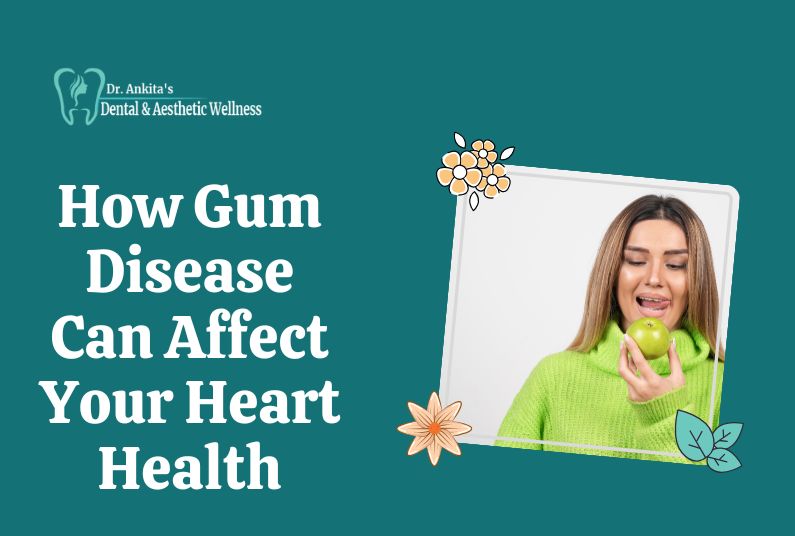When we think about health, we often categorise it: heart health, dental health, mental health — as though each exists in isolation. However, emerging research shows how interconnected these aspects of health truly are. One surprising connection is between gum disease and heart health. Many studies indicate that untreated gum infections can contribute to serious cardiovascular issues. At Tourius, we believe in holistic well-being, and today, we’re shedding light on this critical connection. Let’s dive into how gum disease impacts your heart health and why maintaining oral hygiene is vital for overall wellness.
What is Gum Disease?
Gum disease, or periodontal disease, is a bacterial infection that affects the gums and the structures supporting your teeth. Plaque, a bacterial film that is sticky, starts to build up on teeth. Plaque turns into tartar, which irritates the gums, if it is not eliminated with good oral hygiene. Gum disease has two primary stages:
- The initial signs of gingivitis are swollen, red gums that bleed easily.
- Gingivitis can develop into periodontitis, which is characterised by the gums pulling away from the teeth. This problem may result in tooth loss if treatment is not received.
While gum disease mainly affects oral health, research has found alarming links between periodontitis and cardiovascular diseases.
Gum Disease’s Connection to Heart Health
What effect does a mouth infection have on the heart, then? Researchers suggest multiple ways in which gum disease can increase the risk of heart-related complications.
- Chronic Inflammation: A Common Risk Factor
Inflammation causes gum disease and heart disease. In order to combat bacteria, the body starts an inflammatory response when your gums get infected. However, chronic inflammation can spread beyond the mouth through the bloodstream, causing damage to the arteries and increasing the risk of heart disease. Heart attacks and strokes can result from atherosclerosis, or the hardening of the arteries, which is a result of chronic inflammation in the blood vessels.
- Bacteria Entering the Bloodstream
Dangerous oral germs can enter the bloodstream when gum disease results in bleeding gums. Once in the blood, these bacteria can travel throughout the body and latch onto injured areas in the arteries, triggering blood clots or even infecting the lining of the heart. Infectious endocarditis, a dangerous illness where germs infect the heart’s inner lining, can result from this in extreme circumstances.
- Increased Risk of Hypertension and Stroke
High blood pressure, or hypertension, is more common in people with severe periodontitis. The inflammatory response caused by gum infections raises levels of C-reactive protein (CRP), a marker linked to both periodontal disease and cardiovascular events. Elevated CRP levels make it harder to manage existing heart conditions and increase the likelihood of a stroke.
4. Diabetes, Heart Health, and Gum Disease: A Risky Cycle
Particularly worrisome is the connection between diabetes, heart disease, and gum disease. Diabetes impairs the body’s ability to fight off infections, making individuals more prone to gum disease. In turn, gum disease can worsen blood sugar control, creating a vicious cycle. Both diabetes and gum disease increase the risk of cardiovascular complications, making oral health a critical part of managing diabetes and preventing heart disease.
Symptoms of Gum Disease: Things to Watch for
For gum disease to stay under control and not worsen and impact other areas of your health, early detection is essential. Common symptoms include:
- Red, swollen, or bleeding gums
- Persistent bad breath
- Gums pulling away from teeth (receding gums)
- Loose or shifting teeth
- Pain when chewing
If you notice any of these signs, it’s crucial to see a dentist as soon as possible. Early treatment can prevent gum disease from developing into more severe forms and reduce its impact on your overall health.
Protecting Both Your Heart and Oral Health
In addition to maintaining the aesthetic appeal of your smile, avoiding gum disease is essential for heart health. Here are some ways you can look after your oral and cardiovascular health:
- Practise Good Oral Hygiene
To maintain plaque-free, healthy gums, brush your teeth twice a day and floss daily. Moreover, mouthwash containing antibacterial compounds can help reduce oral microorganisms.
2. Visit the Dentist Regularly
Make an appointment for routine dental cleanings and exams every six months. Dentists can catch early signs of gum disease and treat them before they progress.
- Eat a Heart-Healthy Diet
A diet rich in fruits, vegetables, and whole grains not only benefits your heart but also supports your gum health. Avoid sugary foods that promote plaque buildup.
- Manage Chronic Conditions
If you have diabetes or heart disease, work closely with your healthcare provider to manage these conditions. Maintaining dental health and lowering the risk of cardiovascular issues are made easier with proper diabetes management.
- Quit Smoking
The risk of heart disease and gum disease is greatly increased by smoking. Quitting smoking is one of the finest ways to improve your overall health.
Collaborative Care Between Dentists and Cardiologists
Your dentist and cardiologist must work together to provide collaborative care since gum disease is linked to cardiovascular health. If you have a history of heart problems, let your dentist know, as they may need to take extra precautions during treatments. Similarly, if you’ve been diagnosed with gum disease, it’s worth informing your cardiologist to ensure that your heart health is closely monitored. This collaborative strategy can guarantee the best possible care and lower the risk of problems.
Conclusion
The link between heart health and gum disease emphasises the value of a comprehensive approach to wellbeing. Taking proper care of your teeth and gums can help you keep a beautiful smile, but it can also protect your heart and the rest of your body. By practising good oral hygiene, managing chronic conditions, and staying on top of routine dental visits, you can reduce the risk of both periodontal disease and cardiovascular issues.

